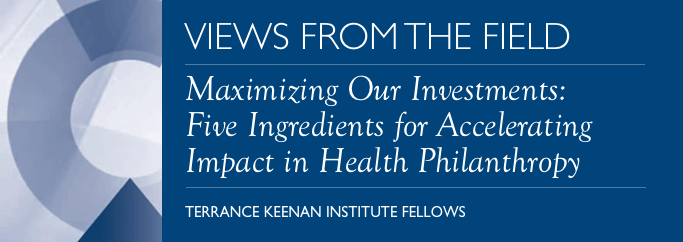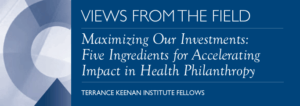
The 2016 Terrance Keenan Institute fellows gathered to discuss leadership, collaboration, and best practices in grantmaking. Several prominent issues emerged, including how to effectively demonstrate the impact of philanthropic investments. This article outlines our perspective on several of the most prominent challenges and opportunities for measuring impact, promoting learning, and disseminating knowledge.
Bold Goals Require Authentic Partnerships
We are not naïve about the time and investment it takes to develop authentic partnerships. However, we need to be honest about how much philanthropy can contribute and be willing to invest in developing authentic partnerships with public and private organizations to leverage and maximize our investments. We must continually challenge ourselves to work in partnership with the community and grantees to develop collective long-term goals that can evolve over time.
One such effort is the BUILD Health Challenge, which “supports partnerships taking Bold, Upstream, Integrated, Local and Data-driven approaches to community health.” First launched in 2014 by The Advisory Board Company, The Colorado Health Foundation, the de Beaumont Foundation, The Kresge Foundation, and the Robert Wood Johnson Foundation, this effort now includes a dozen regional and national funders. BUILD seeks to align philanthropic efforts, reduce the burden on grantees, and identify and disseminate models of effective cross-sector partnerships.
No Data Without Stories, No Stories Without Data
Despite progress in understanding that measuring impact is not just about collecting and analyzing data, much work remains to ensure strategies that look beyond the data are incorporated into evaluation approaches. We know that data alone does not tell a complete story. Even when data is compelling, data collection is often burdensome, and small nonprofit organizations typically lack the capacity to do it well. Philanthropy must invest in approaches that build and strengthen grantee capacity to collect data that is appropriate to their size and mission. We also need to acknowledge the power of qualitative data to complement the numbers and humanize the impact.
For example, the Building Evaluation Capacity Initiative (BECI), an initiative of The Thomas Scattergood Behavioral Health Foundation, The Barra Foundation, The Philadelphia Foundation, and the United Way of Greater Philadelphia and Southern New Jersey, offers select organizations consultation and training in practical program evaluation skills to track program processes and outcomes and learn to explain data effectively. The initiative increased the ability of participants to communicate more effectively about their programs, identify the need for more staffing, and develop new positions in the areas of evaluation and continuous quality improvement.
Shared Learning as the Expectation, Not the Exception
It is encouraging to witness a growing emphasis on building collaborative efforts across funder organizations. This is particularly important when developing relationships with funders who may be working on issues outside our focus area or starting a new collaborative effort. While there seems to be consensus that funders should strive to strengthen opportunities to learn from one another, this type of collaboration requires capacity that often feels beyond reach when managing the day-to-day responsibilities of grantmaking.
Getting involved in regional grantmaking associations or funding collaboratives are efficient and convenient ways to strengthen collaborative opportunities. These groups are useful for those of us working to advance progress on larger social problems that touch multiple systems. Outlets such as Funders Together to End Homelessness and Youth Transition Funders Group provide an opportunity to create relationships between local and national funders, which is often a missing piece of philanthropic discussions.
Systems Change and the Ripple Effect
Another positive trend in philanthropy is assessing how investments can change systems. Funders continuously work to reach that elusive balance between the need for short-term quantifiable goals and longer-term impact, and there is an increasing recognition that we do not fund in a vacuum. Funders are investing in a range of strategies, like field-building and community engagement and organizing, recognizing that these are critical to system change. However, since philanthropic resources are relatively modest in comparison to those allocated to the systems we are trying to improve, a critical consideration is how to maximize impact. This is why many in philanthropy turn to evaluation.
Successful evaluations can demonstrate results. If a well-designed evaluation can show the impact of a pilot program, there is the potential to garner more sustainable funding from other entities, vastly increasing the impact of philanthropic investment. Whether it is defining impact, setting goals, or capturing learning, an evaluator should play a key role in striking the right balance between short and long-term outcomes. Authentic evaluation requires that the culture of measurement is prioritized at all levels, and particular care has to be taken with grantees to ensure they have a clear understanding of the purpose and goals of the evaluation.
Several years ago, the Conrad N. Hilton Foundation hired a Monitoring, Evaluation and Learning (MEL) partner for each of its six strategic initiatives. The MEL partners help in designing, continuously improving, and assessing the effectiveness of the strategic initiatives. Rather than focusing on individual grants, the MEL partners are focused on the big picture and work closely with staff to ensure that Hilton investments are advancing the broader set of goals outlined in each strategy.
Preparing for the Marathon, Not the Sprint
Progress can seem glacial at times, but supporting slow, steady work is very much a reality for those of us whose organizations fund challenging issues. The complexity of changing policies or systems cannot be overlooked. While one three-year grant will not change the world, it may lay vital groundwork for doing so. Many of us engage in longer-term commitments, and constantly strive to find tangible ways to measure progress along the way. Determining a way to measure short-term results in a practical and compelling way helps ensure that grantmaking is iterative and responsive. The need for flexibility to stay the course, but also respond to emerging issues without losing focus is inherent in achieving our goals.
These five areas are complex and finding the opportunities within them takes dedicated time. However, if we acknowledge impact measurement and knowledge development as activities that strengthen our investments and our community partners, they are worth the effort.

